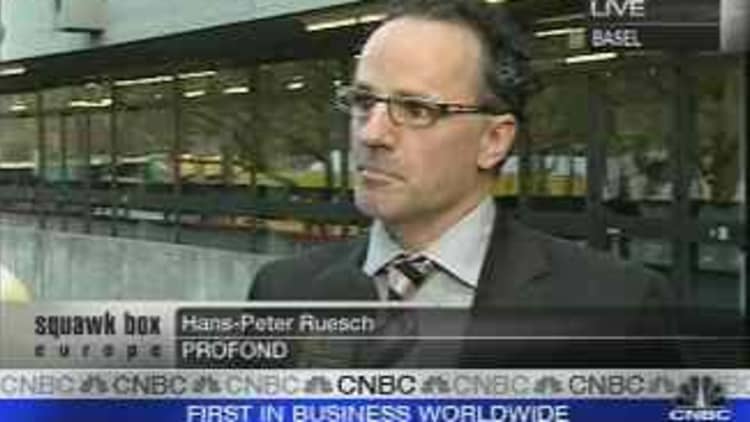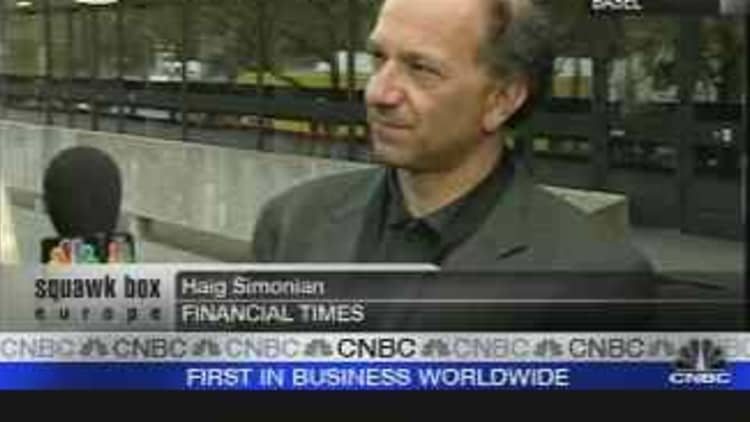Shareholders in UBS backed a 13 billion Swiss franc ($11.94 billion) capital injection from Singapore and an unidentified Middle East investor but heaped scorn on the bank's chairman, Marcel Ospel, over subprime losses.
The vote, carried by a large majority at an extraordinary shareholders' meeting, came after Ospel appealed to investors, saying the funds were vital to the bank's future.
"Today we need your backing for a massive strengthening of our capital base," Ospel told the gathering. "We believe that this measure is absolutely necessary."
Ospel, 58, has survived at the helm of the giant Swiss bank after culling top managers over the past year as UBS chalked up $18 billion in charges following disastrous investments in U.S. subprime mortgages.
The veteran chairman said he could not currently tell whether there was the need for further writedowns on its massive portfolio of subprime-related investments.
Europe's worst writedowns triggered a loss for 2007, the bank's first since its inception, and forced it to seek 19 billion Swiss francs in emergency capital to repair its depleted capital ratios.
Despite facing calls for his resignation, Ospel said he would not "thoughtlessly relinquish" his responsibilities. "I intend to ensure that UBS gets back on the road to success."
He also said UBS would redouble efforts to cut its exposures to mortgage-backed securities and derivatives.

Shareholders earlier voted down a motion by advocacy group Ethos for a special audit to establish how UBS, which was reputed to have one of the best risk management systems in the financial industry, got bogged down in the subprime quagmire. They also approved the bank's proposal to pay a stock dividend, instead of a cash payment, which will help boost UBS's capital.
Shareholders Lash Out
The bank had misjudged market trends in subprime and had then failed to react adequately, said Ospel. "We judged certain markets wrongly. We subsequently noticed this error, but due to the rapid evolution of events were unable to react in time."
Earlier, thousands of shareholders converged on a sports arena in Basel for the meeting which started at 9 am London time and is being billed as the most important shareholder gathering in UBS's history.
Some speakers pulled no punches. "I think it would be better if the whole board would be replaced and that their pensions be withdrawn," said one angry Swiss shareholder. "If you listened to past warnings, all this would not have happened."
"A bank is not a casino. You've placed high bets and you've lost a lot," said another stockholder.
Shareholders approved the issue of 11 billion francs in notes, convertible into UBS stock, to Singapore's Government Investment Corporation (GIC) and of a further 2 billion francs of mandatory convertible notes to be placed with an unidentified Middle East investor.

Replacing the 2007 cash dividend with a stock dividend allows UBS to raise its tier 1 capital by 4.4 billion francs. The capital injection will help boost tier 1 capital to around 12 percent from 8.8 percent at the end of 2007.
Foregone Conclusion
Analysts had said there was little chance of shareholders throwing out the motion for a capital increase in view of the scale of the bank's losses. UBS's stock price has dropped by well over 50 percent since mid-2007.
Smaller shareholders had argued it was unfair that they cannot participate in the mandatory convertible bond and said the bank should make a rights issue.
But analysts say a rights issue would have to be made at a discount to the market price, forcing the bank to issue even more shares and to dilute the stock further.
Investors have seen shares in the bank slide from a high of 80.45 francs in early June last year to 36.10 francs on Tuesday.
Analysts fear there may be billions of dollars in fresh writedowns to come after the bank earlier this month revealed exposures to risky U.S. residential mortgages other than subprime which were much higher than previously thought.
Adding to the bank's woes, Germany HSH Nordbank has started legal proceedings to recover steep losses on a $500 million portfolio of collateralized debt obligations (CDOs), linked to the fortunes of the U.S. mortgage market, which it bought from the Swiss bank in 2002.
Some investors are surprised Ospel has not been forced out.
UBS last week said it would propose re-electing Ospel but reducing his term of office to one year. The proposal will be put to shareholders at an annual assembly in April.
"I was a bit astonished by the fact that he will stay for a year. Ospel has been too weakened to remain for long. I think they are already looking for a successor," said Schupp.
Switzerland's Federal President Pascal Couchepin has waded into the controversy by saying in an interview with newspaper Bilan he was indignant that Ospel, who is the country's best- paid executive, could keep everything he had earned from the bank in the past now that UBS is losing money.
UBS shares closed higher by 1 percent Wednesday.

